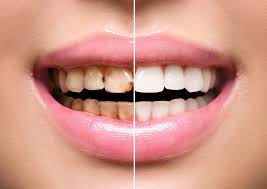Good oral hygiene is essential for maintaining healthy teeth and gums, but sometimes brushing and flossing alone aren’t enough to prevent plaque and tartar buildup. What you should know about dental scaling & polishing is that these professional procedures are crucial for keeping your mouth in top condition. Teeth Polishing & Scaling help prevent gum disease, tooth decay, and even bad breath by removing stubborn plaque and tartar that brushing can’t reach.
What Is Dental Scaling?
Dental scaling is a deep cleaning procedure that targets and removes plaque and tartar from the surfaces of your teeth and underneath the gumline. Tartar buildup, if left untreated, can lead to gum disease, so scaling is an essential part of maintaining oral health.
- Removes plaque and tartar from hard-to-reach areas
- Helps prevent gum disease and cavities by reducing bacterial buildup
- Reduces inflammation and bleeding in the gums
- Cleans below the gumline, an area that regular brushing misses
Scaling can be done manually with hand instruments or using ultrasonic tools that vibrate to break down the tartar, making the process more efficient and less invasive.
What Is Dental Polishing?
After scaling, the next step is dental polishing, which smoothens the surfaces of the teeth and helps remove any remaining plaque and stains. Polishing makes your teeth look brighter and ensures that plaque is less likely to accumulate again.
- Removes surface stains caused by coffee, tea, or smoking
- Smoothens the enamel to make it more resistant to plaque buildup
- Leaves the teeth with a polished, shiny appearance
- Enhances breath freshness by clearing away debris and bacteria
Polishing is usually done with a special rotating rubber cup and gritty paste, which is gently applied to the tooth surfaces.
Why Are Scaling & Polishing Important for Oral Health?
The benefits of dental scaling & polishing go beyond a cleaner, shinier smile. Regular cleanings help protect your teeth and gums from various issues that can cause long-term damage.
- Prevents gum disease: Scaling removes the bacteria that cause gingivitis and periodontitis
- Reduces the risk of cavities by eliminating tartar and plaque that contribute to decay
- Improves overall health by reducing the risk of systemic conditions linked to poor oral hygiene, like heart disease
- Boosts self-confidence by improving the appearance of your smile
Regular dental cleanings help maintain a healthy mouth and can prevent costly dental treatments in the future.
How Often Should You Get Scaling & Polishing?
While the timing of scaling and polishing varies from person to person, most people should have a professional cleaning at least once every six months. However, several factors may affect how often you need a cleaning.
- People with gum disease may need more frequent cleanings to manage inflammation and plaque
- Smokers may require more frequent visits due to increased tartar buildup
- Individuals with braces should have more frequent cleanings to prevent plaque accumulation
- Those with dry mouth or excessive plaque buildup might need additional cleanings
Your dentist or hygienist can recommend a cleaning schedule tailored to your individual needs based on the condition of your teeth and gums.
What to Expect During a Scaling and Polishing Appointment?
The process of Teeth Polishing & Scaling Treatment is straightforward and usually completed in one visit. It’s important to know what to expect so you can feel comfortable during your appointment.
- Initial examination: Your dentist will examine your teeth and gums to assess the level of plaque and tartar buildup
- Scaling: Using hand tools or ultrasonic devices, the hygienist will carefully remove tartar from your teeth
- Polishing: After scaling, your teeth will be polished using a rubber cup and special paste
- Post-treatment care: You may be given advice on brushing, flossing, and maintaining your oral hygiene to keep your teeth clean
Most people feel a significant difference after the procedure, with cleaner, smoother teeth and a fresh feeling in their mouth.
Maintaining Oral Health Between Professional Cleanings:
While dental scaling & polishing are important for maintaining oral health, it's essential to continue proper dental care at home. Your at-home routine can help prevent plaque buildup and keep your teeth and gums healthy between professional cleanings.
- Brush twice a day with fluoride toothpaste
- Floss daily to remove plaque between your teeth
- Use mouthwash to kill bacteria and maintain fresh breath
- Limit sugary foods and drinks that promote plaque buildup
- Stay hydrated to help with saliva production, which naturally helps clean your teeth
By combining professional cleanings with good at-home care, you can maintain your oral health and prevent the need for extensive dental treatments.





Comments